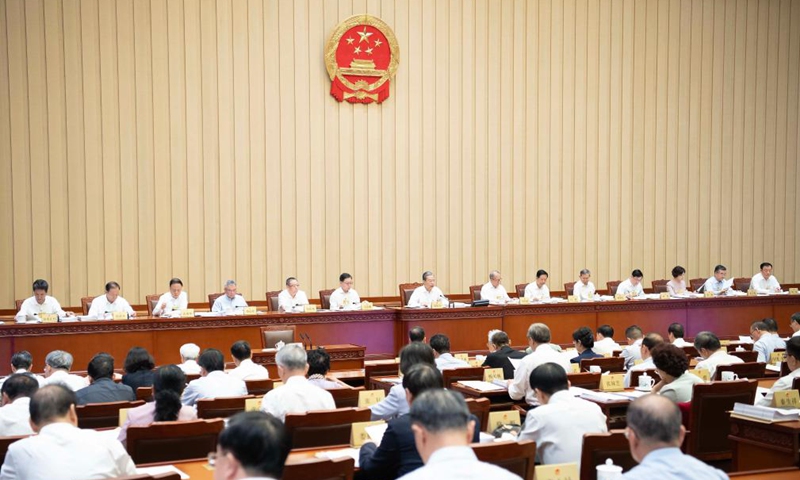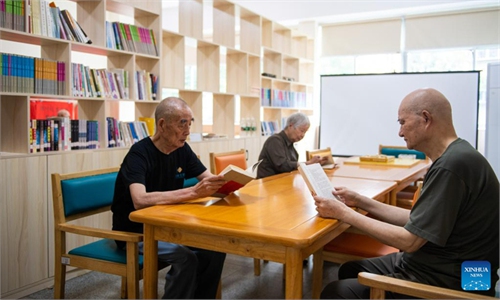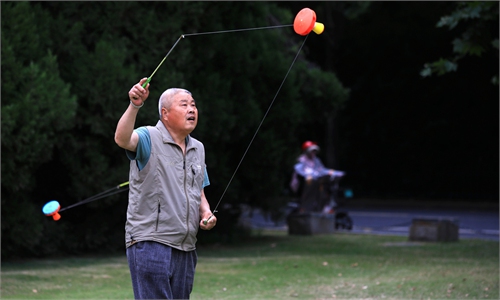
Zhao Leji, chairman of the National People's Congress (NPC) Standing Committee, presides over the first plenary meeting of the 11th session of the 14th NPC Standing Committee at the Great Hall of the People in Beijing, capital of China, Sept. 10, 2024. (Xinhua/Li Tao)
China's top legislative body on Tuesday started a regular session to review a raft of bills, including a draft decision on gradually raising the statutory retirement age, the Xinhua News Agency reported.
The move to adjust the retirement age is in line with both international practice as well as changes in China's demography and social and economic development, and is conducive to unleashing the full potential of China's increasingly high-quality population development to tackle demographic changes and support Chinese modernization, experts said.
Zhao Leji, chairman of the 14th National People's Congress (NPC) Standing Committee, presided over the first plenary meeting of the committee's 11th session.
The move came after a resolution, adopted by the third plenary session of the 20th Communist Party of China (CPC) Central Committee in July, outlined the task of refining its population development strategy in response to an aging population and a declining birth rate.
According to the resolution, in line with the principle of voluntary participation with appropriate flexibility, China will advance reform to gradually raise the statutory retirement age in a prudent and orderly manner. Details of the bill have yet to be revealed.
Experts noted that the move is in line with the actual situation of China's rising average life expectancy and schooling years, and conforms to the need to improve the efficiency of human resources.
"As life expectancy continues to rise, there will also be more people aged 50-60 who are willing to work at their posts for a longer period of time," Zhou Haiwang, deputy director of the Institute of Population and Development under the Shanghai Academy of Social Sciences, told the Global Times.
In addition, the reform is conducive to tackling another change in China's demographic - an aging population, according to Yuan Xin, vice president of the China Population Association and a professor at Nankai University.
Average life expectancy in China has risen to 78.6 years as of 2023, Xinhua reported in August, citing a report released by the National Health Commission, compared with 57 years in 1957.
In 2023, China's natural population growth rate was a negative 1.48 per thousand people, with those aged 65 and above accounting for 15.4 percent of the total population, Xinhua said in a separate report.
The dependency ratio of the elderly population in China reached 22.5 percent in 2023, an increase of 9.4 percentage points compared to 10 years ago. This has led to a reduction in the labor supply and created pressure on the continued disbursement of pensions, the report said.
Necessary choice
Against such a background, gradually raising the statutory retirement age is a timely move based on the need for China's economic, social and population development, and a necessary choice to adapt to the "new normal" in China's demographic change, and to support Chinese modernization, experts noted.
"It is a rational approach that balances the interests of all parties under the constraints of China's current population structure and social diversification," said Yin Xiwen, a researcher from the Tian He Institute of Labor Relations at Jilin University, in an interview with Xinhua.
"It also echoes with the global mainstream practice to cope with demographic change," Yuan told the Global Times, noting that almost all developed countries, including the US, have set the retirement age at 65 or older.
It also adapts to China's changing demographics as well as improved education level and health situation of the population, experts said.
China's current retirement system, formed in 1950s, has set a relatively low retirement age - female employees retiring at 50 or 55 and male employees at 60. The average effective age of labor market exit was 64.4 years for men and 63.1 years for women across OECD countries in 2022.
Experts allayed concerns that the reform could lead to pressure on the employment market, stressing that the impact could be "minimized" as the plan will be implemented in a phased manner and a series of supporting measures in labor market and pension system will also facilitate the transition process.
Gradually raising the statutory retirement age is just part of China's broader efforts to address the demographic changes. It has pledged to improve the employment-first policy and its social security system, as part of a comprehensive set of reforms outlined in the resolution adopted by the third plenary session of the 20th CPC Central Committee.




